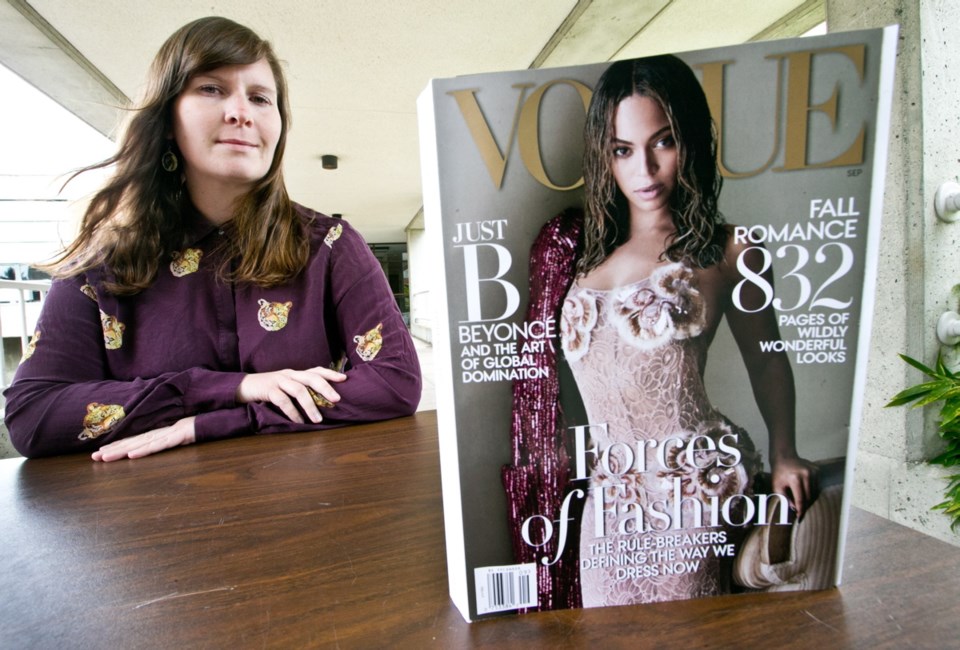What separates Beyoncé from Bach? Is it even fair to separate popular music and established classics? Melissa Avdeeff, a lecturer in the University of Victoria department of music, says a better question is: What do Beyoncé and her popularity tell us about ourselves, our community and our society?
“I come at this music as a sociologist,” said Avdeeff, who returns to UVic this term for the second time to teach a course on Beyoncé.
“I don’t find much worth in putting value judgments on it,” she said. “It’s better to ask: ‘What is Beyoncé’s music doing to society?’ or ‘How is it reflected in society?’ ”
Avdeeff believes too many people make needless, even unfair, judgments about the authenticity or credibility of pop stars such as Beyoncé. They do this even as one-time pop stars, including the Beatles, are regularly studied in universities and their music is routinely played by great orchestras.
“I’m not denying we shouldn’t have courses on the Beatles,” said Avdeeff. “So why is there an issue with Beyoncé, who is a black, female pop star as opposed to these old, white rockers.”
Susan Lewis, acting dean of fine arts at UVic, said media and popular culture are well established as areas of study at universities, and Avdeeff’s course on Beyoncé follows a standard academic pattern of inquiry.
“It’s a rather conventional model of a case study using a high-profile public figure,” Lewis said.
“The real value in such courses looking at popular culture is they give students a better understanding of the contemporary world and the chance to discuss culture as it is happening.”
Avdeeff said Beyoncé as a study subject might be catching on. Already another Canadian university, Waterloo, is offering a course on the singer.
Also, she said, last year’s student feedback on the course was all positive. One student declared it the most interesting course the student had taken all year.
As for the worthiness of the subject matter, Avdeeff said popular performers can have a significant, even profound, effect on contemporary culture.
For example, Beyoncé’s 2008 song Single Ladies (Put a Ring On It) kicked off a whole dance craze.
More recently, at the 2014 MTV Music Video Awards, Beyoncé appeared on stage with one word, “FEMINIST,” lit up in large letters behind her.
Avdeeff said that moment redefined the word “feminist,” prompting valuable media discussion and even removing some of the semi-apologies that too often accompany the word.
“We get a lot of conversations that start with ‘I’m not a feminist but ...’ or ‘I’m a feminist but ...’ ” said Avdeeff.
“Beyoncé has helped to make it more acceptable to just say: ‘I’m a feminist, I believe in equal rights,’ point blank,” said Avdeeff. “She has made it a more acceptable topic.”
As for artistry, Avdeeff believes a notable creative hallmark of modern pop music is its enormous collaboration.
A modern, musical release is a huge effort involving many people — producers, backup players, sound technicians, recording engineers, even choreographers, dancers and camera operators for the video.
“She is a great collaborator,” Avdeeff said. “She obviously knows the best people to get the best sound and the best production and, in that way, she is pretty cutting edge.
“So, even though she is an established R and B, pop singer she now has her own style, she has this individual ‘Beyoncé style.’ ”
Now, Beyoncé’s pop persona has taken another step by almost refusing to engage. Her recent Vogue cover was not accompanied by an interview. She doesn’t use Twitter and rarely engages in social media.
It’s as if the singer communicates only through her performances and music, an interesting way of engaging with the modern hyper-connected, digital, social-media world.
But ultimately, Avdeeff said, popular music just exists. As with all musical forms, it is written and produced to accomplish specific things.
It doesn’t really matter if it is ever acknowledged as authentic or truly artistic.
“I don’t think pop needs to be great art or if that is even the point of it,” she said.
“The point is to just have some fun, maybe form an emotional connection, maybe it is to just get up and dance.”
